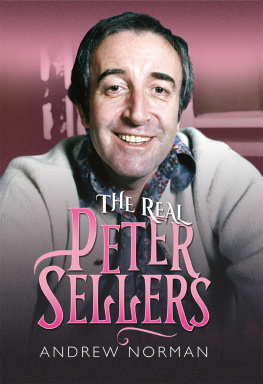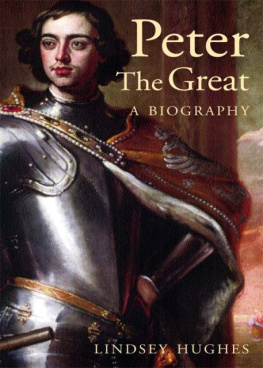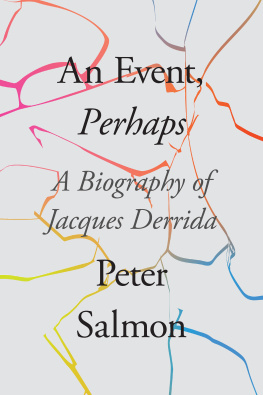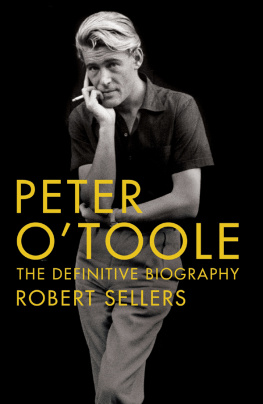Ed Sikov - Mr. Strangelove: A Biography of Peter Sellers
Here you can read online Ed Sikov - Mr. Strangelove: A Biography of Peter Sellers full text of the book (entire story) in english for free. Download pdf and epub, get meaning, cover and reviews about this ebook. year: 2003, publisher: Hyperion, genre: Non-fiction. Description of the work, (preface) as well as reviews are available. Best literature library LitArk.com created for fans of good reading and offers a wide selection of genres:
Romance novel
Science fiction
Adventure
Detective
Science
History
Home and family
Prose
Art
Politics
Computer
Non-fiction
Religion
Business
Children
Humor
Choose a favorite category and find really read worthwhile books. Enjoy immersion in the world of imagination, feel the emotions of the characters or learn something new for yourself, make an fascinating discovery.
- Book:Mr. Strangelove: A Biography of Peter Sellers
- Author:
- Publisher:Hyperion
- Genre:
- Year:2003
- Rating:4 / 5
- Favourites:Add to favourites
- Your mark:
- 80
- 1
- 2
- 3
- 4
- 5
Mr. Strangelove: A Biography of Peter Sellers: summary, description and annotation
We offer to read an annotation, description, summary or preface (depends on what the author of the book "Mr. Strangelove: A Biography of Peter Sellers" wrote himself). If you haven't found the necessary information about the book — write in the comments, we will try to find it.
Mr. Strangelove: A Biography of Peter Sellers — read online for free the complete book (whole text) full work
Below is the text of the book, divided by pages. System saving the place of the last page read, allows you to conveniently read the book "Mr. Strangelove: A Biography of Peter Sellers" online for free, without having to search again every time where you left off. Put a bookmark, and you can go to the page where you finished reading at any time.
Font size:
Interval:
Bookmark:
PART ONE
DOWN THE RABBIT HOLE: 192557
PART TWO
IN WONDERLAND: 195764
PART THREE
THROUGH THE LOOKING GLASS: 196480
A LSO BY E D S IKOV
On Sunset Boulevard: The Life and Times of Billy Wilder
Laughing Hysterically: American Screen Comedies of the 1950s
Study Guide for American Cinema
Screwball: Hollywoods Madcap Romantic Comedies
To Edward Hibbert,
who makes my work possible.
To Bruce Schackman,
who makes the rest possible.
Some forms of reality are so horrible we refuse to face them, unless we are trapped into it by comedy.
To label any subject unsuitable for comedy is to admit defeat.
Peter Sellers
DOWN THE RABBIT HOLE
192557
Who in the world am I? Ah, thats the great puzzle!
I n 1924, a low-end music hall performer called Peg Sellers gave birth toa baby boy. She named him Peter. Peg had long been dominated by herimposing impresario of a mother, Welcome Mendoza, and she was eagerto focus her own fierce maternal drive on the tiny boy. But Peter Sellersdied quickly and was buried and never mentioned again.
Welcome Mendoza was, truly, the outlandish name with which PegSellerss mother was born, though she changed it twice along the way: firstto Marks when she got married, then to Ray when she elbowed her kidsonto the music hall stage. Showmanship and aggression ran strong in thisfamily. Welcome Mendoza Marks, who started calling herself Belle Raywhen she became a vaudeville manager, was the granddaughter of the mostrenowned Jewish prizefighter of the eighteenth century.
Strange to say, there were many brawling Jews in that era: Aby Belasco,Barney Star of the East Aaron, Lazarus the Jew Boy, the curiously namedIkey Pig.... But the best of them, the strongest and scrappiest, was DanielMendoza, whose fabulous life in the ring was set up, however indirectly,by a gang of Jewish killers. In the spring of 1771, a flourishing group ofcircumcised thieves (led by a doctor, of all people) was busily breaking intoChelsea houses and successfully removing items of interest. The crime spreecame to an abrupt end in June when, in the midst of a heist, they madethe mistake of killing somebodys servant. The doctor and his gang werequickly apprehended, tried, convicted, and hanged, but the rest of Londons Jewish population felt a more long-lasting effect. I have seen manyJews hooted, hunted, cuffed, pulled by the beard, spit upon, and barbarously assaulted in the streets, a contemporary wrote. Dogs could not beused in the streets in the manner many Jews were treated.
Daniel Mendoza was five years old at the time of the Chelsea murder,the consequence being that throughout his childhood and adolescence noJewish boy in London was safe from Christian harassment. Daniel wasnaturally tough, even belligerent, and he learned to protect himself. Whenhe got older he trained other boys to fight as well, and eventually, as Mendozas contemporary noted, it was no longer safe to insult a Jew unless hewas an old man and alone. Thrashing others was not Daniels first careerchoice, however. After his bar mitzvah he set himself on course to becominga glassmaker, but his apprenticeship came to a quick end when he couldnthelp but beat up the glaziers son. He moved on to assist a greengrocer butspent so much time physically avenging the grocers wife against the insultsof shoppers that he soon moved on again, this time to a tea shop, wherehe responded to a customers complaint about the service by clobberinghimfor forty-five minutes. The bruised patron, however, had sense. Heresponded not with legal action but with sound advice: He convinced Daniel to become a professional fighter.
Until his great-great-grandson surpassed him in both fame and fortune,Daniel Mendoza was his familys brightest star. (The great-great-grandsonacknowledged this fact in several of his films by hanging portraits of Mendoza in the background; a certain inept French detective, for instance, isan admirer of Daniel Mendoza.) The prizefighter left a curious series ofpersonality bequests. Like his descendent, Mendoza liked to assume otheridentities if his own grew dull. Mendoza and his friends once decided togo out on the town in the guise of seamen and were promptly arrested,having been mistaken for group of sailors who had just jumped ship. Likehis descendent, Mendoza didnt quit show business after facing a hostileaudience. Theres the story of Mendoza showing up at a Purim pageant andbeing hired on the spot to perform; the audience booed, the manager refused to pay, and Mendoza, never one to back down from a dispute, simplypersisted in his demands until he got his fee. And he was inevitably thevictim of trouble, never the cause. As described by a contemporary, healways was the injured party. In his own estimation, never was there sucha mild mannered man as he. The fights just seemed to seek him out. Cana sense of victimization be genetic?
Mendoza made and lost a vast amount of money in his life. His abidingconcern for the box office led him to stage one of several grudge matcheswith his archrival, Richard Humphreys, on the riverbank, specifically tokeep gatecrashers away. He never imagined that they would simply arrive by boat, a fact that bugged him for the rest of his life. The Prince of Walesintroduced his friend Mendoza to his father; thus Daniel Mendoza rodethe royal carriage to Windsor Castle and met George III. They strolled onthe terrace together, the King of England and the street fighter from theEast End. It was the first time the monarch had ever spoken to a Jew. Afterwinning his first professional bout and earning the sum of five guineas, hewent on in 1785 to whip a fighter called Martin the Butcher in a recordtwenty minutes and earned, thanks to the patronage and friendship of thePrince of Wales, more than 1,000a fantastic sum at the time.
Mendoza tended to spend more than he earned, a common enoughfailing, and more than once he spent time in debtors prison. As he aged,prizefighting had to be supplemented with catering. Process serving. Recruitingsoldiers. Innkeeping. Inciting a mob. Baking. Mendoza died in1836 at the age of seventy-three, leaving a wife, eleven children, and nomoney.
Daniels son Isaac married a woman named Lesser, who bore Welcome.Welcome married Solomon Marks and bore Peg. Peg married Bill Sellers.In 1925 Peg and Bill had another baby to replace the dead one. They calledhim Peter, too.
Welcome Mendoza Marks was prolific and shrewd, not only as a businesswomanbut as a mother. She birthed, fed, and raised a total of eight sonsGeorge, Harry, Chick, Alfred, Lewis, Dick, Moss, and Bertand twodaughters, Cissie and Peg, whose real name was Agnes. When SolomonMarks died, Welcome was dynamic enough to corral her ten offspring at ahouse at Cassland Crescent, Hackney, and press upon them the idea of afamily theater troupe and management company. She called it Ray Brothers,Ltd., having decided that Belle Ray was a more fitting name for a womanof the theater, though everybody around her called her Ma.
Ma Ray was Mama Rose with skill, better luck, and more children. Shenever aimed at art. Commerce was her goal, and the more the better. Fromnothing, she came to manage forty other vaudeville companies in additionto her own, though Ray Brothers, Ltd., was always her chief concern. Thecompany survived, even thrived, but the hard fact was, vaudeville was alreadyon its way out. As clever as Ma was as a theater manager, a moreprescient enterprise would have been the business of motion picture exhibition.And even within the slowly declining world of the English music hall, Ray Brothers were never top-notch. They dont seem to have everplayed Londononly provincial theaters, a heavy component of whichwere summer seaside resorts.
A German inventor sold Ma her big inspiration: a large but transportable water tank. In it, barely clad nymphs (her daughters) would frolic forthe pleasure of an audience (mostly men) who hadnt come to see Shakespeare. Ma called her first revue Splash Me! It was prurient, and it soldwell. The only problem, her grandson later claimed, was that the tank brokeone evening and eventually drowned the band.... Seriously drowned!(Asked by the interviewer how someone could be unseriously drowned,the grandson was vague: Yes, anyway...)
Font size:
Interval:
Bookmark:
Similar books «Mr. Strangelove: A Biography of Peter Sellers»
Look at similar books to Mr. Strangelove: A Biography of Peter Sellers. We have selected literature similar in name and meaning in the hope of providing readers with more options to find new, interesting, not yet read works.
Discussion, reviews of the book Mr. Strangelove: A Biography of Peter Sellers and just readers' own opinions. Leave your comments, write what you think about the work, its meaning or the main characters. Specify what exactly you liked and what you didn't like, and why you think so.








